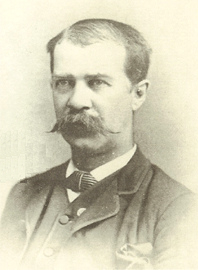Dyer Lum
labor activist and poet (1839–1893)
Dyer Daniel Lum (February 15, 1839 – April 6, 1893) was an American anarchist, labor activist and poet. A leading syndicalist and a prominent left-wing intellectual of the 1880s, Lum is best remembered as the lover and mentor of early anarcha-feminist Voltairine de Cleyre.

Quotes
editWhy I Am a Social Revolutionist (1890)
edit- Why I Am a Social Revolutionist, Twentieth Century 5 no. 18 (October 30, 1890): 5–6
- Established order, being an instituted fixity, excludes reform, and whoever advocates change by that very act becomes an enemy to it.
- The wisest government is that which but responds readiest to the demand to which its own establishment had given birth, and for this reason will yield only as forced by fear to give something rather than risk losing all.
- Is not the whole long career of the proletariat but the “Martyrdom of Man” strewn with whitened bones, cemented with scalding tears welling up from broken hearts, and stained with the bleeding feet of countless millions?
- Events are the true schoolmasters, and smarting under the White terror which yearly sacrifices its millions the Social Revolutionist does not hesitate to invoke the Red terror, knowing that here the words apply that “he who loseth his life shall save it.” But how? By words of rodomontade? By inviting others to do by simply preaching the gospel of discontent? No; but by deeds. The Social Revolutionist is not moved by revenge nor by mere impulse. When Alexander II was killed, when Cavendish and Burke were sent to judgment, when John Brown shot men he had never before met, the world understood the full significance of each act.
The Fiction of Natural Rights (1890)
edit- The Fiction of Natural Rights, Liberty. VI, 25 (February 15, 1890) 1
- To my mind, the very assumption of “natural rights” is at war with evolution.
- Social intercourse has slowly evolved the Ideal that peace, happiness and security are best attained by equal freedom to each and all; consequently, I can lay no claim in equity to a privilege, for that which all alike may enjoy ceases to be privileged. The important deduction from social evolution is that as militancy has weakened and industrialism widened its boundaries, liberty has ever tended toward such equalization, Privilege finds sanction in equity as right, because it violates the ideal of social progress — equality of opportunities.
- Precisely as water flows to a level when obstructions are removed, just so will social relations flow to equitable conditions when restrictions are swept away. And precisely also as liberty comes in does the assertion of “rights” go out.
Quotes about Dyer Lum
edit- Until my imprisonment I had believed that except for Albert Parsons, Dyer D. Lum, Voltairine de Cleyre, and a few others America was barren of idealists. Her men and women cared only for material acquisitions, I had thought. John Swinton's account of the liberty-loving people who had been and still were in every struggle against oppression changed my superficial judgment.
- Emma Goldman, Living My Life (1931)
- Dyer D. Lum proposed the creation of "co-operative homes," and Voltairine de Cleyre later elaborated the idea: "I would destroy the individual 'home' with its waste of forces and have instead magnificent palaces, spacious grounds. . swimming rooms, bathrooms, everything on a large scale," yet with private rooms for every individual whenever he or she desired to be alone.
- Margaret S. Marsh, Anarchist Women, 1870-1920 (1981)